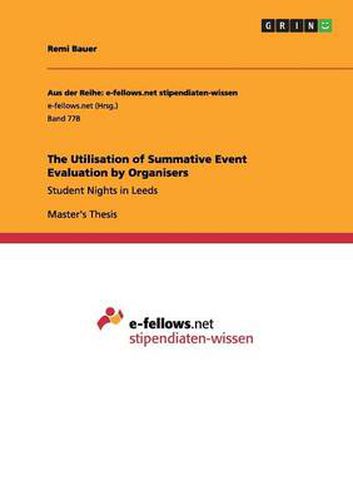Readings Newsletter
Become a Readings Member to make your shopping experience even easier.
Sign in or sign up for free!
You’re not far away from qualifying for FREE standard shipping within Australia
You’ve qualified for FREE standard shipping within Australia
The cart is loading…






Master’s Thesis from the year 2012 in the subject Business economics - Miscellaneous, grade: 1,5, Leeds Metropolitan University (Carnegie Faculty), course: International Events Management, language: English, abstract: In the events industry, post-event evaluation is becoming more and more recognised as a respected management tool for measuring success and a utensil for specifying whether objectives are accomplished. Yet, publications by academics and scholars have mostly overlooked the area which investigates the approaches organisers take for evaluating their events. To address this research gap, this study examines the evaluation approaches taken by student night organisers within the city of Leeds. Student nights are defined as events taking place during late-night hours, being part of the night-time economy, which is a unique, unrepeatable and spatio-temporally restricted happening that specifically targets the student market of a city. The paper outlines that this is a relevant market segment for event organisers due to its size. With an internet content analysis and an online questionnaire, student night organisers’ opinions on evaluation and their approaches to assess success were investigated. With the empirical research, the dissertation shows that post-event evaluation theories, specifically goal-attainment models, are put partially into practice within the night-time economy. However, student night organisers in the city of Leeds do not take advantage of the full potential offered by the utilisation of summative event evaluation due to inconsistencies within the evaluation processes and frequencies. Further, the study identifies that organisations in the night-time economy measure success and assess performance when organising student nights mostly via economic objectives such as profit, cost and attendee numbers.
$9.00 standard shipping within Australia
FREE standard shipping within Australia for orders over $100.00
Express & International shipping calculated at checkout
Master’s Thesis from the year 2012 in the subject Business economics - Miscellaneous, grade: 1,5, Leeds Metropolitan University (Carnegie Faculty), course: International Events Management, language: English, abstract: In the events industry, post-event evaluation is becoming more and more recognised as a respected management tool for measuring success and a utensil for specifying whether objectives are accomplished. Yet, publications by academics and scholars have mostly overlooked the area which investigates the approaches organisers take for evaluating their events. To address this research gap, this study examines the evaluation approaches taken by student night organisers within the city of Leeds. Student nights are defined as events taking place during late-night hours, being part of the night-time economy, which is a unique, unrepeatable and spatio-temporally restricted happening that specifically targets the student market of a city. The paper outlines that this is a relevant market segment for event organisers due to its size. With an internet content analysis and an online questionnaire, student night organisers’ opinions on evaluation and their approaches to assess success were investigated. With the empirical research, the dissertation shows that post-event evaluation theories, specifically goal-attainment models, are put partially into practice within the night-time economy. However, student night organisers in the city of Leeds do not take advantage of the full potential offered by the utilisation of summative event evaluation due to inconsistencies within the evaluation processes and frequencies. Further, the study identifies that organisations in the night-time economy measure success and assess performance when organising student nights mostly via economic objectives such as profit, cost and attendee numbers.